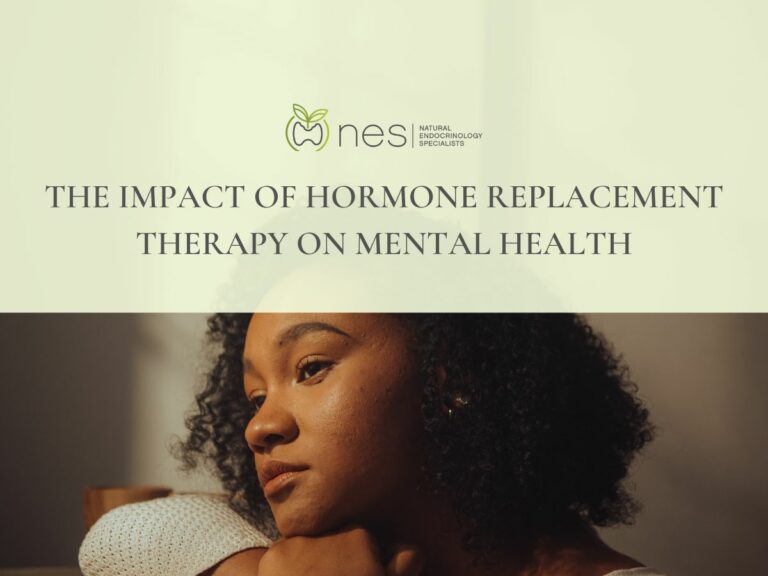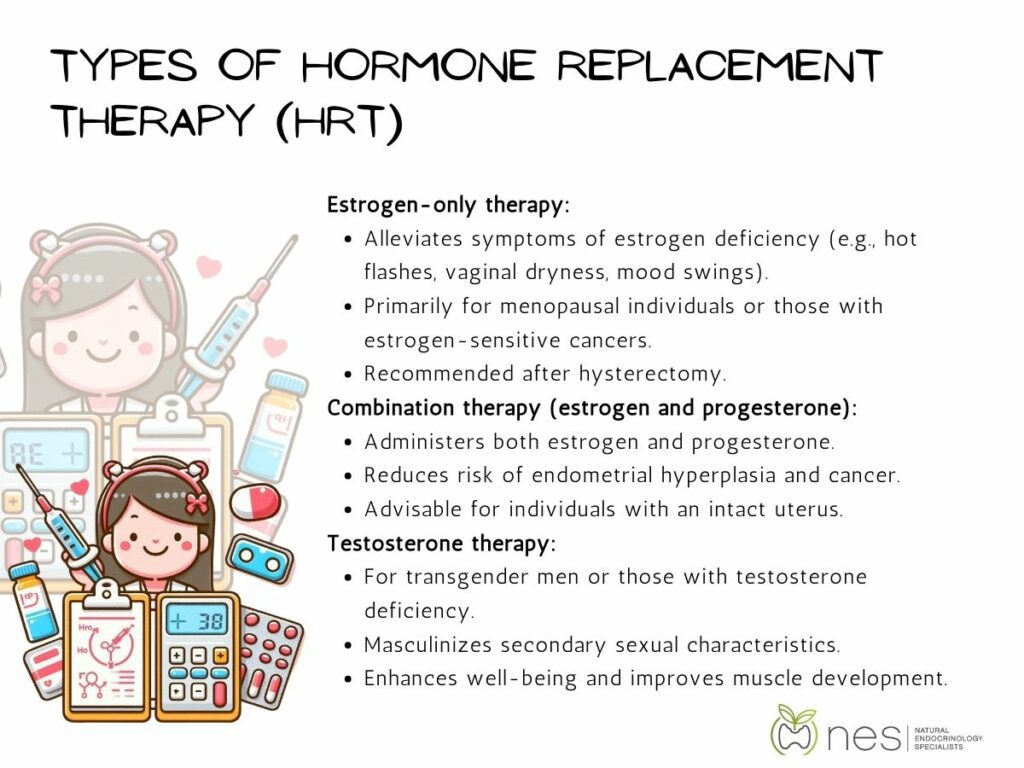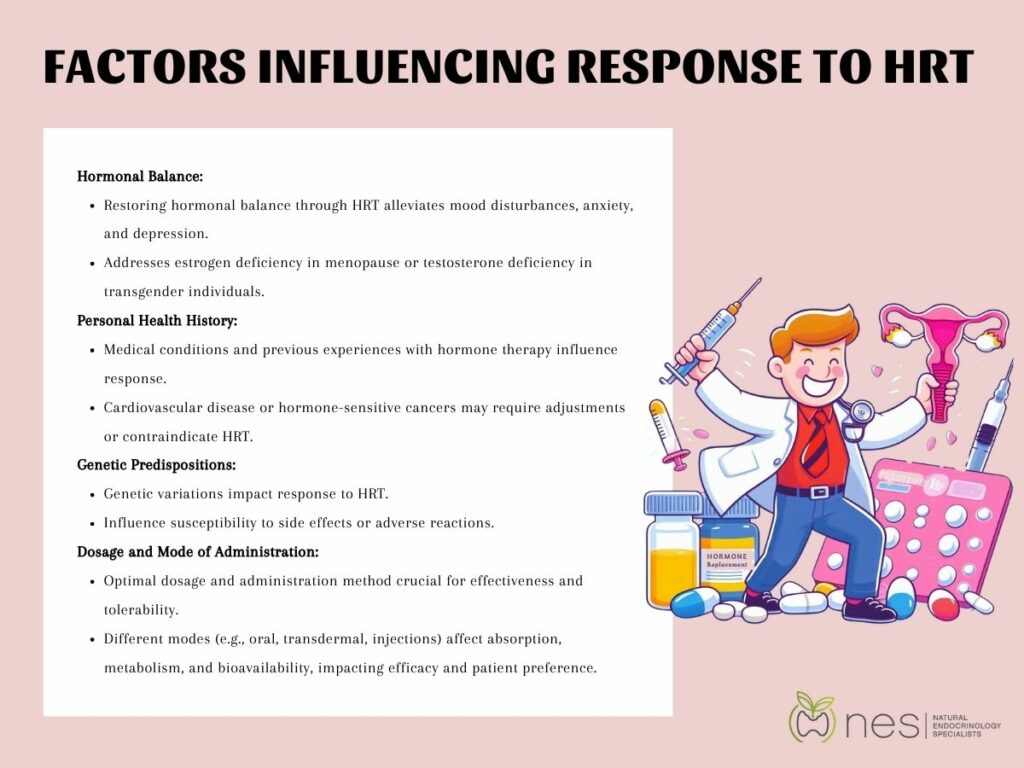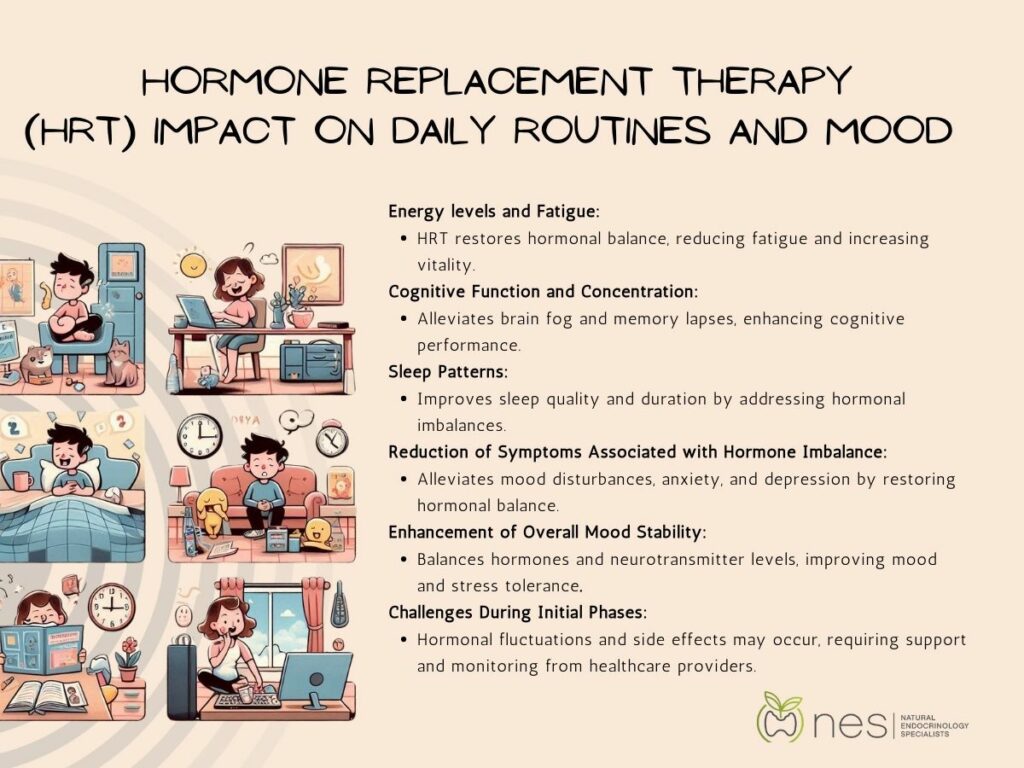Hormone replacement therapy (HRT) involves understanding not only its physiological effects but also its profound implications for mental health. HRT, a medical intervention primarily used to alleviate symptoms of hormone deficiency or imbalance, holds significant promise in improving the quality of life for many individuals. However, its impact on mental well-being remains a subject of […]

Hormone replacement therapy (HRT) involves understanding not only its physiological effects but also its profound implications for mental health. HRT, a medical intervention primarily used to alleviate symptoms of hormone deficiency or imbalance, holds significant promise in improving the quality of life for many individuals.
However, its impact on mental well-being remains a subject of extensive research and discussion. In this blog we will look at the impact of hormone replacement therapy on mental health.
Hormones are important in regulating various bodily functions, including mood and cognition. Therefore, it's no surprise that alterations in hormonal levels, whether due to natural transitions like menopause or andropause or medical interventions like HRT, can significantly impact mental health.
Hormone Replacement Therapy (HRT) constitutes a medical intervention designed to restore hormonal balance within the body. It involves the administration of synthetic hormones to supplement or replace naturally occurring hormones that may be deficient or imbalanced.
HRT is commonly prescribed to address symptoms associated with hormonal fluctuations, such as those experienced during menopause, andropause, or certain medical conditions. Hormone Replacement Therapy includes a range of strategies customized to meet specific demands and medical problems.

The following are key types of HRT:
Estrogen-only therapy is a form of HRT primarily prescribed to alleviate symptoms related to estrogen deficiency, such as hot flashes, vaginal dryness, and mood swings, commonly experienced during menopause. This type of HRT may be recommended for individuals who have undergone hysterectomy (surgical removal of the uterus) or those with a history of estrogen-sensitive cancers.
Combination therapy involves the administration of both estrogen and progesterone and is typically recommended for individuals with an intact uterus to reduce the risk of endometrial hyperplasia and cancer associated with estrogen-alone therapy. Progesterone is added to the regimen to oppose the effects of estrogen on the uterine lining.
While estrogen-only therapy is effective in alleviating symptoms such as hot flashes and vaginal dryness, combination therapy is often recommended for individuals with an intact uterus to reduce the risk of endometrial hyperplasia and cancer.
Testosterone therapy is a specialized form of HRT primarily prescribed to transgender men or individuals with testosterone deficiency. It aims to masculinize secondary sexual characteristics, such as facial hair growth, voice deepening, and muscle development, while also improving overall well-being.
Testosterone therapy is typically prescribed for transgender men, while estrogen and anti-androgen therapy are used for transgender women. However, the psychological impact of hormone therapy may vary among transgender individuals, influenced by factors such as hormone dosage, duration of treatment, and individual response to hormonal changes.
HRT can be administered through various methods, including oral pills, transdermal patches, topical creams or gels, and injections. The choice of administration method depends on factors such as individual preferences, treatment goals, and medical considerations.
Hormones play a fundamental role in regulating brain function, influencing various aspects of mental health, including mood, cognition, and stress response. The brain contains numerous hormone receptors, allowing hormones to exert their effects on neural activity and neurotransmitter systems.
Additionally, hormones influence the structure and function of brain regions involved in emotion processing, memory formation, and stress regulation.
Research on the effects of Hormone Replacement Therapy (HRT) on mental health outcomes has yielded mixed findings. While some studies suggest that HRT may alleviate symptoms of mood disorders and improve overall well-being, others report potential risks and adverse effects associated with hormone treatment.
Factors such as hormone type, dosage, mode of administration, and individual susceptibility can influence the psychological response to HRT.
Hormones modulate the levels of neurotransmitters such as serotonin, dopamine, and norepinephrine, which play critical roles in mood regulation and emotional processing. Fluctuations in hormone levels can disrupt the delicate balance of neurotransmitters, leading to symptoms of anxiety, depression, or mood instability.
Hormones exert their effects on mental health by influencing mood regulation centers in the brain, including the amygdala, hippocampus, and prefrontal cortex. These brain regions play crucial roles in processing emotional stimuli, forming memories, and regulating stress responses.
Changes in hormone levels can alter synaptic connectivity, neurogenesis, and synaptic plasticity within these regions, affecting emotional processing and resilience.
Hormones also modulate the body's stress response through interactions with the hypothalamic-pituitary-adrenal (HPA) axis. Cortisol, the primary stress hormone, is released in response to stressors, helping the body cope with challenging situations.
Dysregulation of the HPA axis, often observed during periods of hormonal imbalance, can lead to chronic stress and increased susceptibility to mood disorders such as anxiety and depression.
The effectiveness and tolerance of HRT can vary widely among individuals due to many factors. These factors encompass biological and psychosocial factors important for tailored treatment plans, optimized outcomes, and ensuring the holistic well-being of individuals undergoing hormone therapy.

Hormonal imbalances, such as estrogen deficiency during menopause or testosterone deficiency in transgender individuals, may contribute to symptoms of mood disturbances, anxiety, or depression. Therefore, restoring hormonal balance through HRT can alleviate these symptoms and improve mental well-being.
Personal health history, including medical conditions, co-morbidities, and previous experiences with hormone therapy, can influence the individual's response to HRT. Certain medical conditions, such as cardiovascular disease or hormone-sensitive cancers, may necessitate adjustments in hormone therapy regimens or contraindicate certain HRT types.
Additionally, previous experiences with hormone therapy may inform treatment preferences and expectations, impacting mental health outcomes.
Genetic factors play a role in determining individual susceptibility to the effects of Hormone Replacement Therapy (HRT) on mental health. Genetic variations in hormone receptors, neurotransmitter systems, or metabolic pathways may influence the response to hormone treatment and predispose individuals to certain side effects or adverse reactions.
The dosage and mode of administration of hormone therapy can impact its effectiveness and tolerability, thereby influencing mental health outcomes. Optimal hormone levels must be achieved and maintained to alleviate symptoms of hormonal imbalance while minimizing side effects.
Additionally, the mode of administration, such as oral pills, transdermal patches, or injections, can affect hormone absorption, metabolism, and bioavailability, leading to variations in treatment efficacy and patient preferences.
Hormonal fluctuations can disrupt various aspects of daily functioning, but HRT offers the potential to alleviate these disruptions and enhance overall well-being. Hormonal imbalances can also contribute to mood disturbances, irritability, anxiety, or depression, affecting daily functioning and overall quality of life.
HRT aims to alleviate these symptoms by restoring hormonal balance and promoting emotional stability and daily functioning.

For individuals experiencing symptoms of hormone deficiency, such as fatigue and lethargy, HRT may help alleviate these symptoms by restoring hormonal balance. Increased energy levels and reduced fatigue are commonly reported benefits of HRT, enabling individuals to engage in daily activities with greater vitality and productivity.
Hormone Replacement Therapy (HRT) may improve cognitive function and enhance concentration by alleviating symptoms of hormone imbalance, such as brain fog or memory lapses. Studies have shown that HRT can positively affect cognitive performance, including memory, attention, and executive function, thereby supporting daily functioning and cognitive well-being.
Hormone Replacement Therapy (HRT) may help improve sleep quality and duration by addressing underlying hormonal imbalances that contribute to sleep disturbances. Estrogen, for example, plays a role in regulating sleep-wake cycles and promoting restorative sleep.
Hormonal imbalances, such as estrogen deficiency during menopause or testosterone deficiency in transgender individuals, can contribute to symptoms of mood disturbances, irritability, anxiety, or depression. Hormone Replacement Therapy (HRT) aims to alleviate these symptoms by restoring hormonal balance and addressing underlying hormone deficiencies.
Research has shown that HRT can effectively reduce symptoms associated with hormone imbalance, leading to improvements in mood and emotional well-being.
HRT may improve mental health and stress tolerance by balancing hormones and maximizing neurotransmitter levels. Patients on hormone replacement therapy (HRT) frequently report increases in their mood, emotional control, and quality of life; these gains lead to increased resilience and coping mechanisms when faced with obstacles.
While Hormone Replacement Therapy (HRT) can offer significant benefits for mood and emotional well-being, individuals may experience challenges and adjustments during the initial phases of treatment. Hormonal fluctuations, side effects, and emotional changes may occur as the body adapts to hormone therapy.
It's essential for individuals undergoing HRT to receive comprehensive support, education, and monitoring from healthcare providers to navigate these adjustments effectively and optimize mental health outcomes.
Hormone Replacement Therapy (HRT) is a valuable tool for symptom relief and hormonal balance restoration; nevertheless, its effects on mental health should be carefully evaluated. Under medical supervision, customized treatment programs are guaranteed, along with hormone level monitoring and treatment adjustments to maximize effectiveness and minimize hazards.
Concurrently, counseling and support resources offer invaluable assistance in managing emotional challenges, enhancing coping strategies, and fostering mental well-being. Counseling interventions, such as cognitive-behavioral therapy, empower individuals to navigate mood disturbances and anxiety associated with hormone imbalances.
Peer networks and support groups offer opportunities for interaction, validation, and sharing of experiences, which promote resilience and a feeling of community. Ultimately, holistic care cultivates a sense of empowerment and an enhanced quality of life by acknowledging the intricacies of hormone swings and enabling individuals to navigate their treatment journey with resilience and confidence.

Acupuncture Session - $189.00
Acupuncture, Package of 4 - $636.00
Female Pellet Insertion Package - $518.00
Male Pellet Insertion Package - $744.00